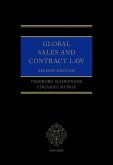Shaping Contracts for Work provides an in-depth examination of the common law's role in shaping employment contracts through the mechanism of implied terms. It constructs a theory which views the nature of the employment contract as distinct from other types of work contract. Terms implied by law into employment contracts, as well as their potential to operate in other non-standard contracts for the performance of work, are critically examined by reference to the test that courts adopt when they are asked to imply such terms. In part one, Golding provides an overarching survey of the law which governs express and implied terms in contracts. In doing so, she considers the broader judicial role in implying terms and assesses how it can fundamentally alter the nature of the relationship between contracting parties. Part two draws comparisons between England and Australia, tracing the origins and status of select terms across both jurisdictions, and exploring how the application of these terms is often presumed. Golding also examines the duties of mutual trust, confidence, and good faith in both jurisdictions, investigating their potential application in employment contracts. In part three, Golding demonstrates why courts need to better articulate their understanding of what constitutes an 'employment contract' as a distinctive class of contract. By focussing on the impact of terms implied by law, this work adds a unique dimension to the debate concerning the regulation of waged work in the context of ever-increasing non-standard modes of work.
Dieser Download kann aus rechtlichen Gründen nur mit Rechnungsadresse in A, B, BG, CY, CZ, D, DK, EW, E, FIN, F, GR, HR, H, IRL, I, LT, L, LR, M, NL, PL, P, R, S, SLO, SK ausgeliefert werden.









